- Home
- Bobby Akart
The Mechanics: A Post-Apocalyptic Fiction Series Page 2
The Mechanics: A Post-Apocalyptic Fiction Series Read online
Page 2
Chapter 2
Saturday, October 1, 2016
1:30 a.m.
The Quabbin Visitor Center
Quabbin Reservoir, Massachusetts
Ronald Archibald paced the floor in front of his handpicked lieutenants. He had no military or law enforcement experience, but he stood alone as the leader of the Belchertown raiding party. Joseph Pearson had offered little assistance in the planning of the raid on Prescott Peninsula. The raid was Archibald’s baby, and he intended it to be a success.
Archibald had successfully recruited and trained nearly three hundred men for the task. Lack of intelligence about the current inhabitants of Prescott Peninsula was a concern, but he was confident in his ability to overrun them with overwhelming force and surprise.
His troops, as he called them, consisted of ordinary citizens from the surrounding areas. They included the local pharmacist, an auto mechanic, an unemployed car salesman, and a retired postal worker. They were different in most respects, from their occupations to their race and gender. But they all had one thing in common—they were hungry, for food and revenge.
The day before, Archibald had whipped them into a hatred-driven frenzy. The residents of Belchertown were now convinced that the enemy consisted of the unknown faces on Prescott Peninsula. These mysterious opponents had food and supplies to save their families. Archibald convinced his troops to risk their lives to attack and claim the supplies for the benefit of the town. Archibald did not reveal to his troops, however, that the enemy was likely made up of seasoned military personnel. That minor detail would have doomed the mission to failure before it started.
“Okay, gentlemen, let’s get down to business,” announced Archibald, calling the group to attention. “Let’s take a look at the map and go over the plan one last time.”
He grabbed one of the men and whispered, “Raise the Allen brothers on the radio. Tell them we’re on time. They’ll know what to do.”
The assistant nodded his head and left the room.
Archibald turned his attention to the room and walked in front of a bulletin board hung on a wall. Above it, on a particle board shelf, sat a stuffed beaver, an owl, and an otter. Under their watchful eyes, Archibald rapped his knuckles on the map.
“We’ve gone over this, but this will be the last time, as we’ll be giving the order to start this party. Sunrise is around 5:00 a.m. and everyone needs to be in position.”
Archibald turned and looked at his men. The murmur of nervous conversation died down when he spoke. He pointed to the letter A on the map.
“This is the Visitor’s Center, which will be used as our fallback position and for wounded triage.”
The group began to whisper again, and Archibald quieted them down. He could sense their trepidation. “Gentlemen, make no mistake, we will take some casualties. I hope not, obviously, but for our families to survive, we must take risks. In the lobby, we have our most capable health care providers and all the medical supplies we could muster. While the success of our mission is paramount, the lives of our friends and neighbors are just as important. If you or the man next to you gets wounded, come back here immediately for medical attention.”
Archibald laid out the plan, first pointing to the letter E. “I will be taking up a command and control position here, on Quabbin Hill, at the Observatory Tower. Those of you assigned to the power boats will convene here, at the launch that I’ve marked as letter C. Gentlemen, you will be the second phase of the attack.”
He moved across the map to point to the left side identified as Pelham. “Just south of Pelham, at letter K, the pontoon boats will be at the ready to cross this narrow stretch of the lake onto the west shore of Prescott Peninsula. You will be the third phase of the attack.”
Next, he slapped his hands at the top of the map, on top of the letter J. “This is where we get their attention—the front gate. Jimmy Fulks was murdered there. The front gate is where the battle begins.”
The men in the room cheered, clearly ready for the task at hand. He allowed the celebration to go on, and then he moved to calm them. He pointed to the other letters on the map designated B, F, G, H, and I. “We have established roadblocks at these remaining locations. We don’t want them to be able to call in any reinforcements. Mano a mano, right, gentlemen?”
“Yes, sir!” they shouted as they patted each other on the back.
“Okay, before I send you out to get into position, does anyone have any questions?”
One hand rose in the rear of the room. “I do, sir.”
“What is it?” asked Archibald.
“We’ve never discussed letter D on the map. What is that for?”
Archibald looked at the tiny island in the middle of the Quabbin Reservoir and grinned. “I’ve got a special surprise in store for these people, and our men who will be carrying it out have been in place for a couple of days. It has already been set into motion, my friends.”
Chapter 3
Saturday, October 1, 2016
1:35 a.m.
Mount Lizzie
Quabbin Reservoir, Massachusetts
“Showtime,” said Will Allen to his younger brother, M.C. He was cold and tired. They had spent forty-eight hours camping on the Quabbin Reservoir. Their first stop was Mount Zion to their north, gathering up a skiff full of timber rattlesnakes. The Allens camped on the island the first night, then in the early morning hours of Friday, they rowed past Walker Hill and along the eastern shore of the Quabbin Reservoir until they reached Mount Lizzie.
Prior to 1939 when the flooding of the Quabbin Reservoir began, Mount Lizzie was the home of the small town of Greenwich. The oldest of the four towns flooded by the Quabbin Reservoir project, Greenwich was incorporated in 1754 under land grants to immigrants of Scottish and Irish heritage following the Indian Wars.
Once known as the Plantation of the Quabbin, the name of a revered Nipmuc Indian, the town was renamed for the Scottish Duke of Greenwich. This was a once thriving town, boasting the first church in the area, the first post office, and one of the first public libraries. Progress, in the form of the Quabbin Reservoir, flooded the historic town eight days after its one hundred and eighty-fourth birthday.
Today, it was one of the smallest islands in the reservoir, but it stood the tallest at an elevation of nearly nine hundred feet. During the day on Friday, the Allen brothers made camp at the summit of Mount Lizzie and observed the activities on the eastern shoreline of Prescott Peninsula through binoculars. They kept their boats and the cargo hidden from view on the east side of the island. They also kept quiet, as voices carried on the water. They were only a mile away from the shore of Prescott Peninsula and the uninhabited Little Quabbin Hill island to their southwest.
“I’m ready,” said M.C. “I’m more than ready to get this over with and get home to the missus. This better be worth it, brother.”
“It will be,” replied Will. “You’re hungry, aren’t you?”
“Yeah, hungry enough to eat them rattlers.”
“Then let’s do this,” said Will. “It’ll take a couple of hours to make our way around the island. Thank God there ain’t a moon tonight. We’ll use the dark skies and Little Quabbin Hill for cover. Then we’ll work our way up towards that point.” He directed his brother’s attention to the pronounced stretch of shore that was nearest Little Quabbin Hill.
“How far do we have to carry the snakes before we release them?”
“I’m not sure, probably a mile or so,” replied Will. “It’ll take us a couple of trips. C’mon. We need to get in position for the signal.”
The two men folded up their camping gear and headed down the eastern slope of Mount Zion to their flat-bottom aluminum boats, which were pulled onto the rocky shore. Although their skiff had a trolling motor, in order to approach undetected, they would have to row the entire distance—not an easy feat when pulling another boat full of dozens of large rattlesnakes.
Over the next two hours, they made their way across the
half-mile stretch of lake undetected. The Allens sought cover on the banks of Little Quabbin Hill while they rested. They could easily row the last few hundred yards in less than fifteen minutes. Their orders were to wait for the signal.
M.C., out of boredom, broke the silence. “How will we know when it’s time to get started? What’s the signal?”
“Don’t worry. We’ll know.”
Chapter 4
Saturday, October 1, 2016
1:52 a.m.
Prescott Peninsula
Quabbin Reservoir, Massachusetts
Julia broke Sarge out of his half-conscious, hypnotic state. He got a chill and attempted to shake it off.
“Honey, are you ready for bed?” asked Julia. “Maybe we should produce an heir to the throne?”
Sarge rolled his neck and released some tension. He took a deep breath, exhaled and sat back in the chair. He realized that he had been on edge all day. This was his first opportunity to relax—alone with Julia.
“Let’s polish off this bottle and talk,” he said.
“Are you okay?” asked Julia. She poured the last of the wine into her cup and handed it to him. She reached over into Katie’s chair and grabbed Sarge a blanket. The temperature was in the upper forties.
Sarge smiled and reached over to hold her hand. “Yeah, it’s been a long day and my brain is tired. I’ve wanted to talk with you alone, and we’ve never had the chance.”
“Suddenly, you’re a very popular guy.”
“I know, Julia, and my mind has been racing all day. I’ve known Mr. Morgan my entire life, but I’ve never really contemplated what he does every day.” Sarge covered himself with the blanket and took another sip of wine. He allowed the fruit flavors to soak into his mouth before swallowing it. Julia studied him and allowed him to continue.
“Am I still a professor? Do I go to work every day at 73 Tremont? Does any of that matter anymore now that the country has been thrown back into the 1800s?”
Julia reached for her wine and emptied the cup, which she put in the pile of empty wine bottles. “No wonder you’re brain-dead. It’s difficult to answer any of those questions or establish a game plan when the world is collapsing around us. Since the cyber attack, we’ve been reacting. Right?”
Sarge allowed the statement to soak in. For the past four weeks, their lives had been a whirlwind of activity—acting in response to a particular situation rather than creating it or controlling it.
“That’s a great point,” said Sarge. “Our survival instincts kicked in, and we hunkered down. Fate keeps throwing us curveballs and …”
“We hit it right back at ’em,” added Julia, finishing his sentence.
Sarge nodded in agreement. “It may be this way for a while, but at some point in time, we need to rebuild our lives.” He stretched out his body and clasped his hands behind his head. “I’ve had quite a bit of wine, and as you know, I can get real philosophical at times.”
“Really? Nah.” Julia laughed.
“You know me,” said Sarge, adding in his best Southern drawl, “I do my best thinkin’ when I’m drinkin’.”
Julia nudged the pile of empty wine bottles and laughed.
“Hey, I didn’t drink all of those!” protested Sarge. She reached over, and he held her hands, which were soft and warm. “You and I have always talked in terms of fate, destiny, and even karma.”
“That’s true.”
“I guess, deep inside, I’ve known this was my destiny,” said Sarge. He stared up at the stars. The new moon allowed faint objects such as galaxies and star clusters to shine unimpeded. We’re such an insignificant part of the universe, yet we are the center of our own.
“You’re not afraid, are you?” asked Julia, indicating unease for the first time that day.
Sarge quickly eased her concerns. “Oh, no, not at all,” he replied reassuringly. “I’ve got a job to do and a whole lot of lives to be responsible for. I’m not sure where to start.”
Julia was briefly quiet and then spoke. “Sarge, Mr. Morgan is not going to leave you out here flailing on your own. It could be worse, you know. He could be dead.”
This reality struck Sarge like a ton of bricks. He could be dead.
“I’d really be shittin’ my pants then.” He laughed.
“Sarge, he’s going to be very supportive of you. You’re the chosen one, so to speak. He will not set you up for failure.”
“I know, I know. It also seems like the others were on board. Cabot and Lowell gave me the impression they were pleased with Mr. Morgan’s decision.”
“I agree,” said Julia. “As I talked with them, and especially Mrs. Lowell, they were enthusiastic in their praise for you and your abilities. Mrs. Lowell hasn’t been happy during this entire ordeal until now.”
“How about our guys, the Quinns, J.J.?” Sarge’s voice trailed off.
Julia let go of his hand and sat up in her chair. “They love and respect you, Sarge. We’ve never had a defined hierarchy, but it was always assumed that you were our fearless leader.”
“Ha-ha, the fearless leader who is over here shakin’ in his boots,” said Sarge. He laughed with Julia at his self-deprecation.
“I think it’s natural to be apprehensive, Sarge. But you know everyone will support you as you take on this new role. We all have our roles, and now you have the ability to be the final decision maker on everything. You hold the power and the purse strings.”
“Julia, I’ll control billions of dollars in assets worldwide. I’ll be able to pick up the phone and call world leaders. Hell, Morgan has a direct line to the President. All of that power and responsibility rests squarely on my shoulders now.” Sarge also sat up in his chair and started to contemplate the magnitude of his new role.
“We can do great things, my love,” encouraged Julia. “Let it all soak in and don’t look at this as some daunting, overwhelming task. You’ve been given the unique opportunity to shape world events in your vision.”
Sarge thought about this. What is my worldview? I used to lecture about this at Harvard. Now I feel like Sarah Palin in the Charlie Gibson interview—dumbfounded.
“Absolutely,” said Sarge. “Our country, hell, the world faces a serious catastrophe. I’m taking the reins of the Boston Brahmin at an opportune time. I don’t think we can solve this crisis by using the same way of thinking that helped put us here in the first place.”
“Now you’re talkin’, Sarge. You have to be optimistic about this opportunity you’ve been given. Besides, you can always cry about it later.”
Chapter 5
Saturday, October 1, 2016
4:52 a.m.
Prescott Peninsula
Quabbin Reservoir, Massachusetts
“Alpha One, this is Bravo Two. We’ve got a vehicle approaching the front gate, sir,” said Corporal David Morrell into his comms. Morrell led a six-man patrol that guarded the front gate and perimeter fence on a twenty-four-hour basis. Because of the unusual hour and the heightened state of awareness his team was practicing, Morrell felt it necessary to notify his immediate superior officer, Chief Warrant Officer Kyle Shore.
“Roger, Bravo Two. Is it hostile?” asked Shore, still groggy from the early wake-up call.
“Unknown, sir,” replied Morrell. “The vehicle is approaching slowly. I’ve called in two men from the shore patrol to assist, if necessary.”
“Roger that, Bravo Two. Stay on mission. Alpha One en route,” replied Shore.
The vehicle came to a halt one hundred yards from the protective cover of the HESCO barriers at the front gate. Morrell gestured for the two soldiers to flank him left and right and take cover positions. They waited. In the distance, he heard the sounds of four-wheelers approaching.
“This is private property!” shouted Morrell to the stopped and idling vehicle. Because the headlights blinded him, he couldn’t discern the make or model, although it appeared to be a pickup or SUV.
He shouted again, “Stop. This is private property. Exi
t the vehicle with your hands over your head and state your business!” There was no response.
Then the vehicle began to roll forward, slowly crunching the gravel under its tires. The truck was closing on the entrance. Seventy-five yards. Fifty yards.
Morrell crouched lower behind the barrier. He shook his head and frowned.
“I don’t like this,” he mumbled to himself. The four-wheelers were approaching from his rear. The truck was inching closer. He had to make a decision.
“Light it …” he yelled until the sound of his voice was muted by a massive explosion. The pickup truck’s payload of fifty-five-gallon drums containing oil, gasoline, and shrapnel was detonated by shots fired from a high-power rifle in the distance. The first two rounds punctured the drums, and the third round ignited the mixture.
A deadly barrage of broken nails, screws, bolts, and ball bearings tore through the gatehouse, obliterating the windows. The soldier closest to the gatehouse was killed instantly. The approaching Marines were knocked off their four-wheelers from the blast. The soldier to Morrell’s right was safely behind the fortified mesh container designed by HESCO for this type of blast.
Morrell received shrapnel wounds to his left arm, which he’d used to shield his face from the blast. He was bleeding but was able to continue.
“Alpha One, this is Bravo Two,” shouted Morrell into his radio. He repeated, “Alpha One, this is Bravo Two.”
“Roger, Bravo Two. I’m two klicks out,” responded Shore. The radio erupted with activity. Orders were directed to all of the patrols as responses came fast and with a clear sense of urgency.
“Charlie Two, this is Charlie Six. Over.”
“Go for Six,” a voice squelched back on the radio.
“This is Charlie Six. Vehicle approaching through the woods at fence post five. Repeat. Vehicle approaching at fence post five. Over.”

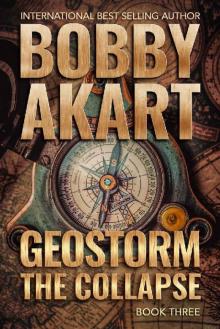 Geostorm The Collapse: A Post Apocalyptic EMP Survival Thriller (The Geostorm Series Book 3)
Geostorm The Collapse: A Post Apocalyptic EMP Survival Thriller (The Geostorm Series Book 3)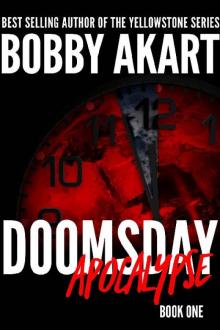 Doomsday Apocalypse
Doomsday Apocalypse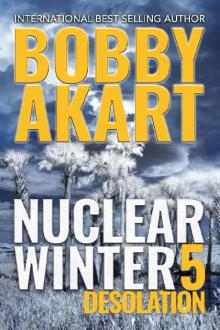 Nuclear Winter Desolation: Post Apocalyptic Survival Thriller (Nuclear Winter Series Book 5)
Nuclear Winter Desolation: Post Apocalyptic Survival Thriller (Nuclear Winter Series Book 5)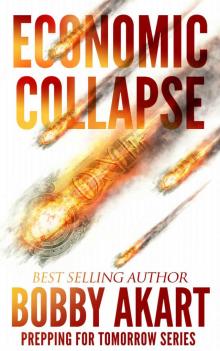 Economic Collapse (Prepping for Tomorrow Book 2)
Economic Collapse (Prepping for Tomorrow Book 2)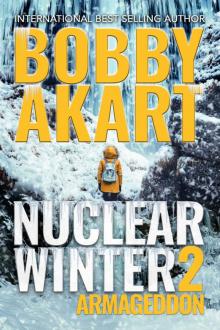 Nuclear Winter Armageddon
Nuclear Winter Armageddon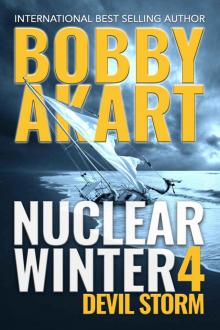 Nuclear Winter Devil Storm
Nuclear Winter Devil Storm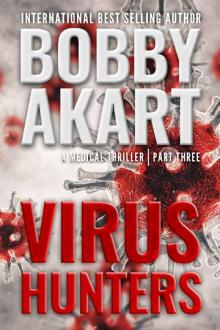 Virus Hunters 3: A Medical Thriller
Virus Hunters 3: A Medical Thriller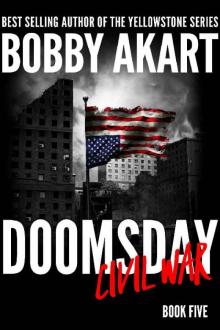 Doomsday Civil War: A Post-Apocalyptic Survival Thriller (The Doomsday Series Book 5)
Doomsday Civil War: A Post-Apocalyptic Survival Thriller (The Doomsday Series Book 5)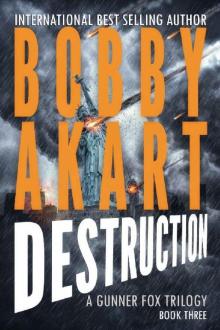 Asteroid Destruction
Asteroid Destruction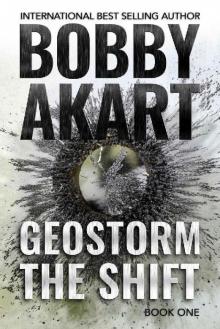 Geostorm the Shift
Geostorm the Shift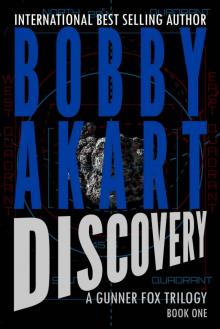 Asteroid Discovery
Asteroid Discovery Virus Hunters 2: A Medical Thriller
Virus Hunters 2: A Medical Thriller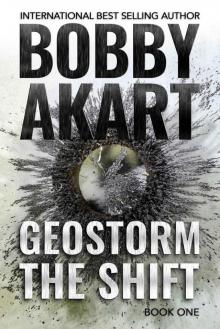 Geostorm The Shift: A Post-Apocalyptic EMP Survival Thriller (The Geostorm Series Book 1)
Geostorm The Shift: A Post-Apocalyptic EMP Survival Thriller (The Geostorm Series Book 1)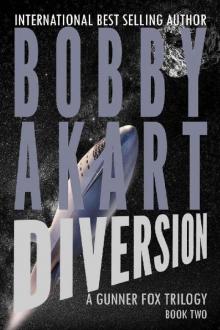 Asteroid Diversion
Asteroid Diversion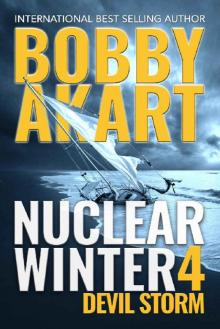 Nuclear Winter Devil Storm: Post Apocalyptic Survival Thriller (Nuclear Winter Series Book 4)
Nuclear Winter Devil Storm: Post Apocalyptic Survival Thriller (Nuclear Winter Series Book 4)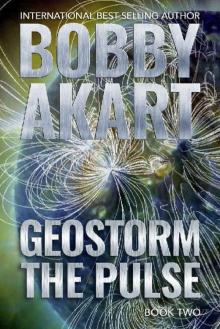 Geostorm The Pulse: A Post Apocalyptic EMP Survival Thriller (The Geostorm Series Book 2)
Geostorm The Pulse: A Post Apocalyptic EMP Survival Thriller (The Geostorm Series Book 2)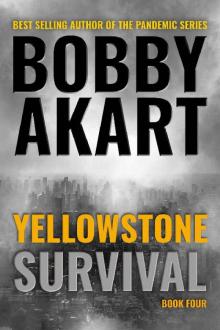 Yellowstone: Survival: A Post-Apocalyptic Survival Thriller (The Yellowstone Series Book 4)
Yellowstone: Survival: A Post-Apocalyptic Survival Thriller (The Yellowstone Series Book 4)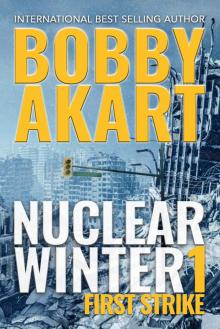 Nuclear Winter First Strike: Post-Apocalyptic Survival Thriller
Nuclear Winter First Strike: Post-Apocalyptic Survival Thriller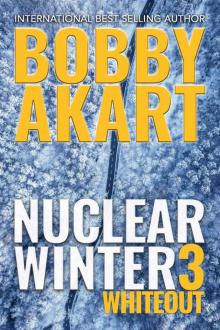 Nuclear Winter Whiteout
Nuclear Winter Whiteout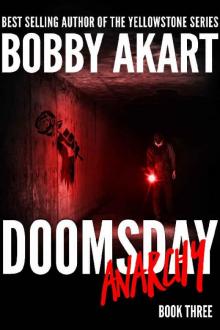 Doomsday Anarchy
Doomsday Anarchy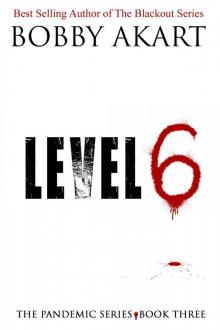 Pandemic: Level 6: A Post Apocalyptic Medical Thriller Fiction Series (The Pandemic Series Book 3)
Pandemic: Level 6: A Post Apocalyptic Medical Thriller Fiction Series (The Pandemic Series Book 3) Martial Law
Martial Law Odessa Reborn: A Terrorism Thriller (Gunner Fox Book 4)
Odessa Reborn: A Terrorism Thriller (Gunner Fox Book 4)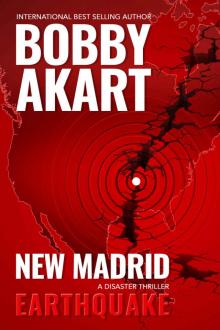 New Madrid Earthquake
New Madrid Earthquake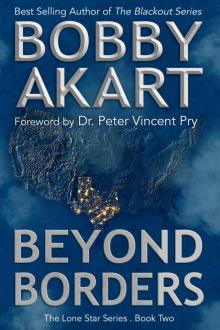 Beyond Borders: Post Apocalyptic EMP Survival Fiction (The Lone Star Series Book 2)
Beyond Borders: Post Apocalyptic EMP Survival Fiction (The Lone Star Series Book 2)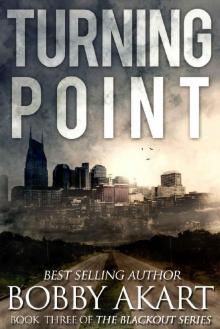 The Blackout Series (Book 3): Turning Point
The Blackout Series (Book 3): Turning Point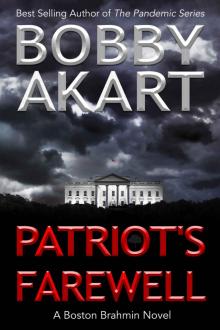 Patriot's Farewell: A Political Thriller Fiction Series (Boston Brahmin Political Thrillers Book 7)
Patriot's Farewell: A Political Thriller Fiction Series (Boston Brahmin Political Thrillers Book 7)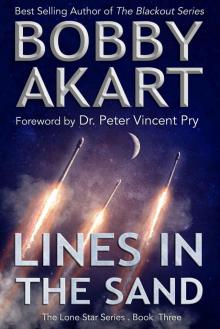 Lines in the Sand_Post Apocalyptic EMP Survival Fiction
Lines in the Sand_Post Apocalyptic EMP Survival Fiction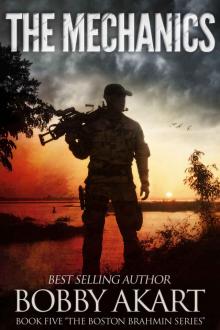 The Mechanics: A Post-Apocalyptic Fiction Series
The Mechanics: A Post-Apocalyptic Fiction Series The Loyal Nine
The Loyal Nine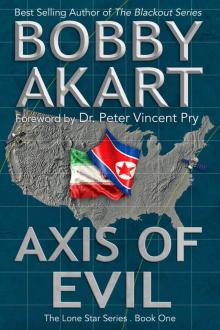 Axis of Evil
Axis of Evil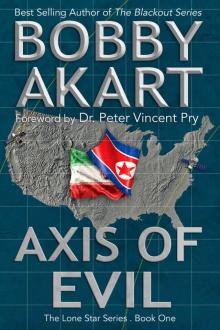 Axis of Evil: Post Apocalyptic EMP Survival Fiction (The Lone Star Series Book 1)
Axis of Evil: Post Apocalyptic EMP Survival Fiction (The Lone Star Series Book 1)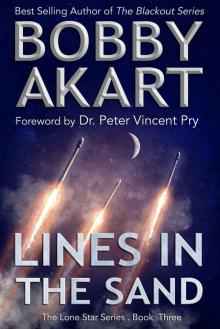 Lines in the Sand: Post Apocalyptic EMP Survival Fiction (The Lone Star Series Book 3)
Lines in the Sand: Post Apocalyptic EMP Survival Fiction (The Lone Star Series Book 3)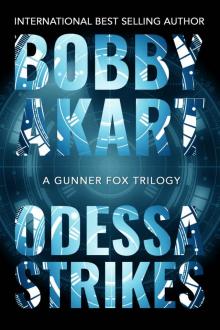 Odessa Strikes
Odessa Strikes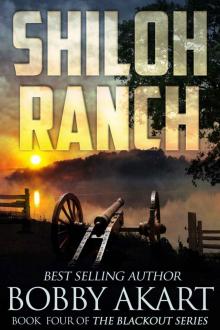 The Blackout Series (Book 4): Shiloh Ranch
The Blackout Series (Book 4): Shiloh Ranch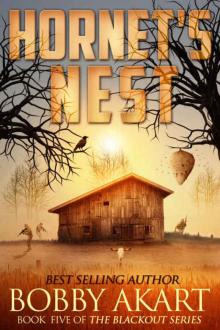 Hornet's Nest: A Post Apocalyptic EMP Survival Fiction Series (The Blackout Series Book 5)
Hornet's Nest: A Post Apocalyptic EMP Survival Fiction Series (The Blackout Series Book 5)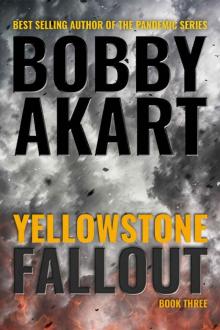 Yellowstone: Fallout: A Post-Apocalyptic Survival Thriller (The Yellowstone Series Book 3)
Yellowstone: Fallout: A Post-Apocalyptic Survival Thriller (The Yellowstone Series Book 3)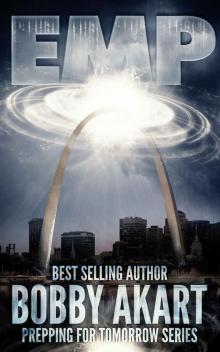 Electromagnetic Pulse
Electromagnetic Pulse Texas Strong: Post Apocalyptic EMP Survival Fiction (The Lone Star Series Book 4)
Texas Strong: Post Apocalyptic EMP Survival Fiction (The Lone Star Series Book 4)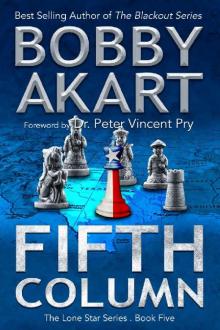 Fifth Column_Post Apocalyptic EMP Survival Fiction
Fifth Column_Post Apocalyptic EMP Survival Fiction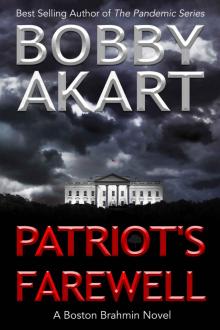 Patriot's Farewell
Patriot's Farewell Texas Strong_Post Apocalyptic EMP Survival Fiction
Texas Strong_Post Apocalyptic EMP Survival Fiction Pandemic: The Innocents: A Post-Apocalyptic Medical Thriller Fiction Series (The Pandemic Series Book 2)
Pandemic: The Innocents: A Post-Apocalyptic Medical Thriller Fiction Series (The Pandemic Series Book 2)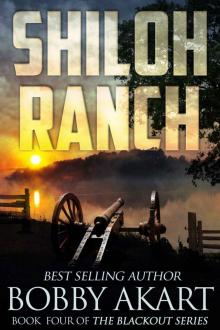 Shiloh Ranch: A Post Apocalyptic EMP Survival Fiction Series (The Blackout Series Book 4)
Shiloh Ranch: A Post Apocalyptic EMP Survival Fiction Series (The Blackout Series Book 4) Cyber Attack
Cyber Attack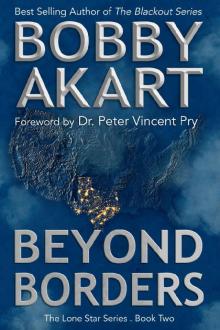 Beyond Borders
Beyond Borders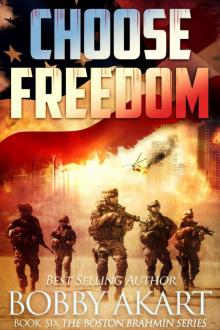 Choose Freedom: A Post-Apocalyptic Fiction Series (The Boston Brahmin Book 6)
Choose Freedom: A Post-Apocalyptic Fiction Series (The Boston Brahmin Book 6)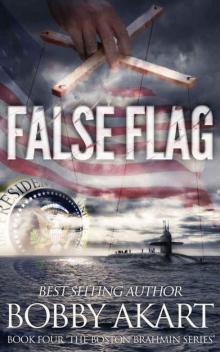 False Flag
False Flag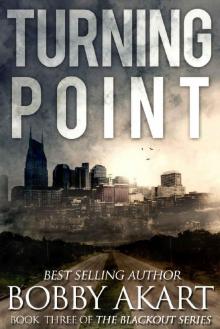 Turning Point: A Post Apocalyptic EMP Survival Fiction Series (The Blackout Series Book 3)
Turning Point: A Post Apocalyptic EMP Survival Fiction Series (The Blackout Series Book 3)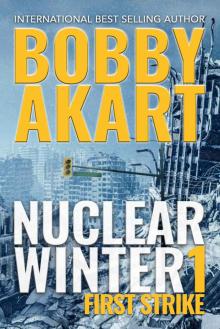 Nuclear Winter First Strike
Nuclear Winter First Strike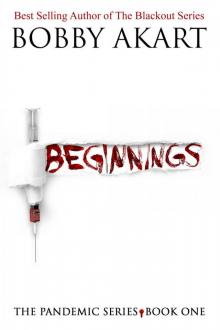 Pandemic: Beginnings: A Post-Apocalyptic Medical Thriller Fiction Series (The Pandemic Series Book 1)
Pandemic: Beginnings: A Post-Apocalyptic Medical Thriller Fiction Series (The Pandemic Series Book 1)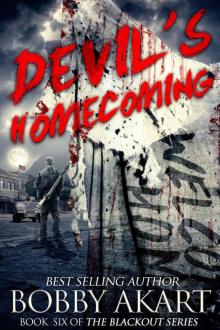 Devil's Homecoming: A Post Apocalyptic EMP Survival Fiction Series (The Blackout Series Book 6)
Devil's Homecoming: A Post Apocalyptic EMP Survival Fiction Series (The Blackout Series Book 6)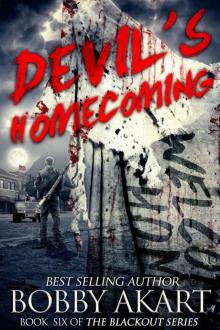 The Blackout Series (Book 6): Devil's Homecoming
The Blackout Series (Book 6): Devil's Homecoming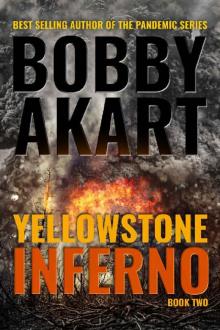 Yellowstone: Inferno: A Post-Apocalyptic Survival Thriller (The Yellowstone Series Book 2)
Yellowstone: Inferno: A Post-Apocalyptic Survival Thriller (The Yellowstone Series Book 2)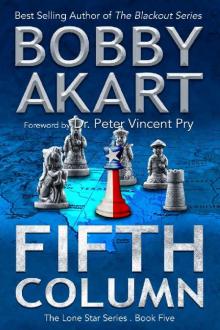 Fifth Column: Post Apocalyptic EMP Survival Fiction (The Lone Star Series Book 5)
Fifth Column: Post Apocalyptic EMP Survival Fiction (The Lone Star Series Book 5)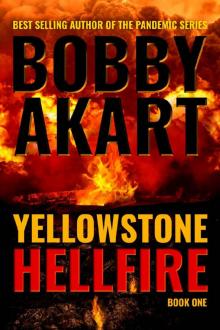 Yellowstone: Hellfire: A Post-Apocalyptic Survival Thriller (The Yellowstone Series Book 1)
Yellowstone: Hellfire: A Post-Apocalyptic Survival Thriller (The Yellowstone Series Book 1) The Blackout Series (Book 2): Zero Hour
The Blackout Series (Book 2): Zero Hour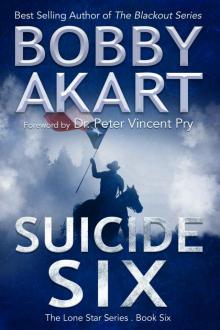 Suicide Six: Post Apocalyptic EMP Survival Fiction (The Lone Star Series Book 6)
Suicide Six: Post Apocalyptic EMP Survival Fiction (The Lone Star Series Book 6)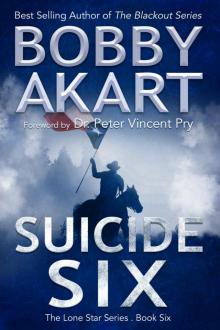 Suicide Six_Post Apocalyptic EMP Survival Fiction
Suicide Six_Post Apocalyptic EMP Survival Fiction Zero Hour: A Post-Apocalyptic EMP Survival Fiction Series (The Blackout Series Book 2)
Zero Hour: A Post-Apocalyptic EMP Survival Fiction Series (The Blackout Series Book 2)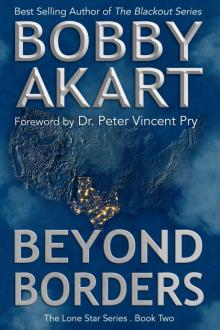 Beyond Borders_Post Apocalyptic EMP Survival Fiction
Beyond Borders_Post Apocalyptic EMP Survival Fiction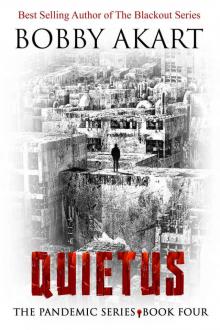 Pandemic: Quietus: A Post-Apocalyptic Dystopian Fiction Series (The Pandemic Series Book 4)
Pandemic: Quietus: A Post-Apocalyptic Dystopian Fiction Series (The Pandemic Series Book 4)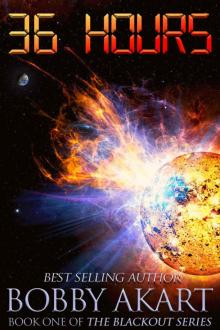 36 Hours: A Post-Apocalyptic EMP Survival Fiction Series
36 Hours: A Post-Apocalyptic EMP Survival Fiction Series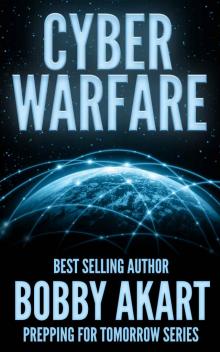 Cyber Warfare
Cyber Warfare